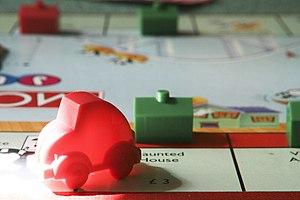When this goes live, I’ll be on the road to the Financial Bloggers Conference outside of Chicago. That translates to a day off here.
Monday, I’ll be back with a whole bucket full of bloggy goodness.
The no-pants guide to spending, saving, and thriving in the real world.
When this goes live, I’ll be on the road to the Financial Bloggers Conference outside of Chicago. That translates to a day off here.
Monday, I’ll be back with a whole bucket full of bloggy goodness.
Kris at Every Tips and Thoughts wrote a post about games and letting her kids win feeling bad about winning. I disagree. This post is an expansion of my comment there.
When we play games in my house, we play for blood. I’ve never let my kids win and they know it. From the first time the kids attempt Memory, they know they’ve got to earn a win against Mom and Dad. They know if they lose, they must do so gracefully. If they pout or cry, they lose game privileges for a while. I demand good sportsmanship, win or lose.
To be clear, my kids are 3, 4, and 11 and they are all held to the same standards of sportsmanship. Win or lose, they will do so gracefully. There will be no temper tantrums when they are Sorry’d and no pouting when the Queen is captured.
It took my son almost 3 years to beat me at chess. When it finally happened, he was almost as proud as I was and still talks about it 5 years later.
It’s not much fun playing games with his friends. They were coddled and expect to win everything. I have to take away game privileges just like I do for my 3 year old. They hate that because we have the coolest board games. Nobody else has games that involve zombies or disembodied brains.
What has the result been?
My kids love playing games. This week, my oldest has been teaching his sisters how to play Life. When he visits his friends, he’s as likely to bring a board game as an electronic game. He’s got a good mind for strategy, and I can’t remember the last time he pouted when I tromped him.
My 4 year old hasn’t mastered gamesmanship yet, but she will. When I threaten to put the game away, she wipes her eyes, and keeps playing, even if her jaw is chattering. She knows what is expected and works to live up to it.
Both of the older kids are competitive. They’ve never had a win handed to them, and they have each had wins they had to work for, and they know how it feels to win and earn it.
The youngest doesn’t care if she wins, she’s just happy to play. In my experience, the competitive gameplay gene doesn’t activate until 4.
In my mind, the real world won’t hand them any wins, so I might as well start teaching them how to work for it now.
How about you? Do you let your kids win, or do you teach them that all games are bloodsports?

It’s hard to know your kids.
We live in a world of constant distraction. Working full time, chasing the kids to whatever activities they’re enrolled in, play-dates, and other commitments all conspire to chase you away from the one thing that truly matters: your family. It’s not enough to be merely present, you have to be engaged.
How can you carve some time out of your hectic schedule to spend time that your kids will never forget?
We play a lot of games in my family and we start far younger than the recommended ages on any of the games we own. I taught my oldest kid to play chess when he was 4 and he caught on well enough to teach his grandmother within a few months. If a game doesn’t require reading, the recommended age is complete fiction. A two-year-old can count, so Sorry! is a good game. 5-year-olds can add, so Monopoly is a good choice that reinforces math skills.
To keep it fun, we have a few generic rules for playing games.
1. We play for blood. Nobody gets to win a game without earning it. It took my son 5 years to beat me in a game of chess. Two years later, he’s still bragging about it.
2. Losers don’t cry. Sportsmanship is important. It’s no fun to play with someone who throws a tantrum for losing. My son’s friends learned that lesson in a hurry.
3. If you’re not a good winner, you won’t play the next game. We talk a little smack when we play, but it’s only in fun. When someone gets mean, their gaming privileges get suspended.
4. The TV is off. We don’t need more distractions. No TV, no texting, no phone, no nothing. Game time is about family time, not about letting the outside world in. Guard this time with your life. I even hesitate to bring in other friends.
5. Video games don’t count. You get far less interaction when you’re staring at a screen. The goal is to have a good conversation while you’re playing and really get to know your family. You can’t do that when the only words coming out of your mouth are “Ack! Zombie Nazis! Shoot him!”
Board games and card games are relatively inexpensive. Settlers of Catan costs less than a trip to the movies. The games don’t wear out quickly, though we are on our third copy of Phase 10. For the price and the time, you don’t have any excuses.
How do you spend time with your kids?

Integrity is what you do when nobody is looking.
Do you cheat at solitaire, steal from an untended garage sale, or keep something a store forgets to charge you for? If so, integrity may not be your strongest trait.
Similarly, if you let the actions of others dictate your behavior, you may be integrity impaired.
If you get cut off in traffic, do suddenly feel justified in cutting off the next guy?
If you have a dollar stolen from your desk, does that make it okay to take a candy bar from the honor-system candy box?
If the last guy left the water cooler empty, are you going to refuse to refill it the next time you are the one to drink the last drop?
If you’re answering yes to these questions, it may be time to examine your moral code. Doing the right thing means doing the right thing all of the time. You can’t be an honorable person if you resort to dishonorable behavior whenever you dislike what someone else does, especially if your actions are hurting an entirely uninvolved 3rd party.
You know the proper behavior. You know what the ethical choice is. The fact that someone else made an unethical choice doesn’t give you a license to be a dick.
If it’s your turn to clean the community refrigerator, do it and do it well, even if the last guy did a poor job.
If the last mom driving the car pool showed up late, don’t deliberately forget her kid.
If someone forgot to pay at a group lunch and you covered it, that doesn’t mean you can skip out on the bill next time.
Even if everything else is taken from you, no one can ever steal your ethics, your integrity, or your honor. Those things are up to you to destroy, and they nearly impossible to replace.
In all cases, in all things, do the right thing. You won’t be sorry.
Resurrected from the archives.
It’s a sad day when kids stop believing in Santa Clause, the Tooth Fairy, and fairies.

Not because I enjoy lying to my kids, but because–on the day they stop believing–a piece of their innocence is lost. An unforgettable, valuable part of childhood dies.
Believing in magic is a beautiful thing.
Do you remember the last time you looked around the world with a sense of wonder? When seeing a puppy form in the clouds was a miracle? When the idea of an ant carrying 1000 times its own weight was something worth watching? When the impossible goodness of a fat man squeezing down your chimney fills you with hope instead of making you call 911?
Do I believe in Santa?
Of course not, but I believe the concept of Santa is worthy of my children’s belief. I don’t want them to lose that innocence and wonder.
When my teenager was young, he asked if Santa was real. I responded by asking what he thought. When he told me he didn’t believe, I offered to let Santa know. His panic told me he wasn’t ready to give up the magic.
The day that conversation didn’t cause a panic, he looked hurt, like he’d lost something precious. He had.
His world of magic was gone.
The he asked why I had spent his lifetime lying to him. I told him the truth. I said I couldn’t bear to be the one to shatter his belief in magic before he was ready.
Then, I informed him that he was in on the conspiracy. He was not allowed to ruin it for anyone else. Not his sisters, not his friends.
That Christmas, my little boy helped me stuff stockings, which was an odd feeling.
The magic was over, but we still got to share the magic of his cousins and sisters.